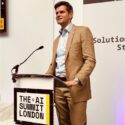On 12th March 20, Brightman, the change management consultancy, hosted an event in Bristol exclusively for public sector CIOs and IT leaders to share the challenges they are facing when attempting to deliver digital transformation. The Digital Transformation People along with journalists from The New Statesman and Tech Market View were invited to attend and interview some of the keynote speakers to look deeper at the issues surrounding digital transformation in the public sector. We were very lucky to be able to send Jack Perschke a highly experienced transformational leader and commentator on digital transformation in government to represent The Digital Transformation People, get up close and explore some key issues:
The interviewees were:
- Jason Liggins – CIO for Crown Hosting Data Centres and CTO for Ark Data Centres
- Romy Hughes – Director at Brightman Business Solutions
- Suzanne Manson – Business Relationship manager at Cornwall County Council
- Edd Parry – Deputy Director for infrastructure and Service at DEFRA (Department for Environment, Food & Rural Affairs)
Jack Perschke: The UK used to lead the Digital Economy and Society Index (EU measure of digital advancement), it’s now dominated by Denmark, Finland and Norway. Having lost the top spot, should the UK have done anything differently over the last few years?
Edd Parry: I’m not sure I’d agree that we’ve got things wrong. From a public sector perspective, I think departments have been a bit schizophrenic – they’ve been traditionally focussed on “keeping the lights on” using traditional control structures. Meanwhile, they’ve also been bitten by agile and cloud first bug. Those two worlds have been running on parallel tracks. So the challenge is how do you bring those two tracks together?
Susanne Manson: I’m surprised the UK is slipping down the rankings – certainly in Cornwall, we’re making the required investments and driving significant digital improvements. Could it be to do with austerity? Digital transformation requires investment and that doesn’t come cheap.
Jason Liggins: The Nordics have significant cost of electricity benefits which is a big advantage for data centres. Denmark, in particular, seems to have benefitted from the shift of transatlantic cables moving towards direct connections with the EU rather than to the UK post-Brexit. I also think the UK is really challenged by old infrastructure and the difficulties of building new sites.
Romy Hughes: I think we should have done things differently. We shouldn’t have spent so much time thinking about digital transformation as a technology thing. It’s just transformation. I also think the governance and funding of transformation in the public sector need to change dramatically for transformation to accelerate. Treasury green book is quite prescriptive but to truly transform you need to have a more experimental mindset.
Susanne Manson: Because digital is agile, it’s really hard to connect it with the standard public sector business case format
Romy Hughes: I would challenge how the governance works – I’d like a more long-term strategic approach. Strategy needs to be about focussing on benefits. The way we spend money could really change if the Treasury and Cabinet Office worked more closely together and focussed on outcomes for the public. The change that needs to happen is a huge culture change. Transformation is about changing the way people work. That’s not short-term – that’s strategic. We can’t just focus on the quick wins.
Edd Parry: Culturally, a lot of govt organisations are quite hierarchical and so the mindset of innovation and freedom of action that you associate with more agile ways of delivering services are slow to permeate into ways of operating. In DEFRA, we’re trying to work out what our digital operating model looks like that can recognise and manage all those differences.
Jack Perschke: Going forward, what would you like to see happen to help enhance the UK as a digital society?
Jason Liggins: I’d like us to focus on skills, we’re challenged by closing off migration from skilled workers through Brexit and young people not being trained to take-up the roles business needs.
Romy Hughes: For me its about changes in governance and more strategic focus on transformation
Susanne Manson: Being a remote county, we have a particular problem with recruiting the right skills, so I definitely recognise that issue. I also think that creating a culture of experimentation is key. Processes can get in the way particularly around procurement which is currently not well aligned to agile ways of working.
Edd Parry: The way we’re looking at it is shifting more towards a product-based model that has a much higher emphasis on the user experience than traditional service management structures. We’re orientating ourselves around discreet products with real ownership.
Jack Perschke: Is that internally Edd, or with your suppliers?
Edd Parry: We have to bring suppliers with us. If we don’t recognise the need to bring the infra suppliers with us, we miss an opportunity to both ensure seamless service but also to leverage the knowledge they have.
Jack Perschke: What have been the key achievements of your organisation in enabling the UK’s digital agenda?
Romy Hughes: Brightman is a digital transformation consultancy SME that has been working in central government for 9 years. So, we’ve been helping the public sector with lots of things. Critically, we’ve helped our clients disaggregate services and transform supply chains which changes behaviours of IT services organisation so that they can operating in a multi-vendor environment.
Susanne Manson: Digital Cornwall was a 3-year programme that we’re just coming to the end of. This was about digital enablers and creating the infrastructure for a digital organisation. Making it one estate and bringing modern tools to the business for our employees. On top of that, we’ve shaped our customer journey strategy for residents and transformed our approach to data. Within the IT department, we’ve transformed too. We’ve moved away from delivery projects to stable agile teams owning products and delivering continuous improvements.
Jason Liggins: One of the barriers to digital transformation is knowing where to start. Organisations can pay lots of money to consultants to plan transformations of their apps’ estate. This can lead to them getting stuck for years without doing anything. Crown hosting helps break that down. It can take apps they have and host them more cheaply. They can then reinvest this money into the rest of the transformations.
Look at the example of electricity costs. Most IT departments don’t feel that it’s a real cost because it doesn’t hit their budget. We’ve found that, through us, departments can make huge electricity savings which are immediate and then available to fund more transformation.
We’ve built a business that has delivered over £2bn in savings to public sector organisations.
Edd Parry: I don’t know where to start – we’ve done loads! I guess the biggest achievement is to land a major end-to-end organisational transformation programme while also supporting DEFRA delivering its huge commitment to EU exit. We’re also really proud of the success we’ve had with sustainable IT – It’s a good example of IT department standing-up to support wider departmental agenda
Jack Perschke: Having talked about your greatest hits, what have been the misses, why do you think they happened and what would you do differently?
Susanne Manson: Resources are scarce so the balance between serving the needs of a changing IT department and a busy business is tough. So far it’s been ok, but the lesson learned is that we must come together in multi-discipline teams to deliver outcomes – not just outputs.
Romy Hughes: The biggest problem we’ve had in the past relates to delivery of arbitrary milestones rather than outcomes. Technology should always be positioned in the right way – focus on the wider picture and measure the outcomes. I think the root cause of these problems is the treasury green book approach that drives a focus on outputs to prove the money is being spent correctly rather than the outcomes being delivered.
Edd Parry: I wouldn’t say we’ve had misses really. It’s been a very challenging time due to the amount of change DEFRA has been going through all at once. If you replace two long-standing supplier contracts with an entirely new model, there will always be bumps in the road. So lots of time and effort has been committed to supporting those suppliers through transition.
Jason Liggins: Our biggest disappointment has been the number of public sector organisations that have got stuck in planning phase. Recently, a department we know had a teams of contractors working for 2 years setting the strategy and then it all just finished without them actually achieving anything. If they’d have worked with us, they could have made fast progress and delivered real savings and improvements.
Jack Perschke: What are your big ambitions for the next few years? What gets your really excited about the near future?
Jason Liggins: We want to deliver more savings to public sector organisations and I’m excited about some of our strongest adopters like DWP and MoD sharing the stories of their success.
Susanne Manson: Cornwall has laid out its digital priorities for the next 5 years. They are – digitise customer experience, digital employees, improving health and wellbeing, addressing the climate emergency and digital prosperity. I’m particularly interested and excited to see what we can do digitally to address the climate emergency.
Romy Hughes: We see digital transformation in the public sector as a growth area. We just want to help more organisations transform. I’m excited about the potential of that transformation. Every organisation can improve, and it is really important to us that they talk to each other. That’s why Brightman has created and funded this event – we see it as part of our role to help public sector organisations irrespective of whether they spend money with us or not.
Edd Parry: There’s a significant govt agenda that DEFRA will play a big part in. What’s possible will depend largely on outcomes in spending review but focus is on the continued success of new digital services in the cloud delivering great value to the public as well as creating new internal capabilities. To do that we’ve got to continue the move from cloud operations to cloud centre of excellence with high levels of automation and self-service. We’ve also got to manage our way through the challenges of the legacy estate.
When I think about all that, what get’s me really excited is unlocking the true potential of the DEFRA group by breaking down silos to enable a much more effective and natural collaboration. This will be truly transformation for the DEFRA group and the society we all serve.
Jack Perschke: Finally, in order to achieve all that, do you see the government taking any learnings from the things that have not worked and changing strategy for delivery in any way?
Romy Hughes: I’d like to see the government reconnect with its commitments around SMEs. They can drive more energy and variety into the supply chain by making G-Cloud much easier for everyone to use. I’d also like them to have another think about savings, how they are measured and when they can be re-invested.
Susanne Manson: We’re focussing on creating a true digital organisation. That requires big changes for everything from skills to leadership and culture. Most importantly, we need to keep the customer at the heart of everything – always asking, “how does that improve the lives of residents in Cornwall?”
Jason Liggins: I hope departments will plan less and do more. The savings we can help them achieve should be a real and immediate incentive. Communication between departments is also key – they can all learn so much from each other.
Edd Parry: The big “how” for me (from an infrastructure/service management/service operations perspective) is about mindset shift within the teams. We need to help our very capable SM professionals move to a more agile mindset that can recognise
Article by channel:
Everything you need to know about Digital Transformation
The best articles, news and events direct to your inbox
Read more articles tagged: Featured









